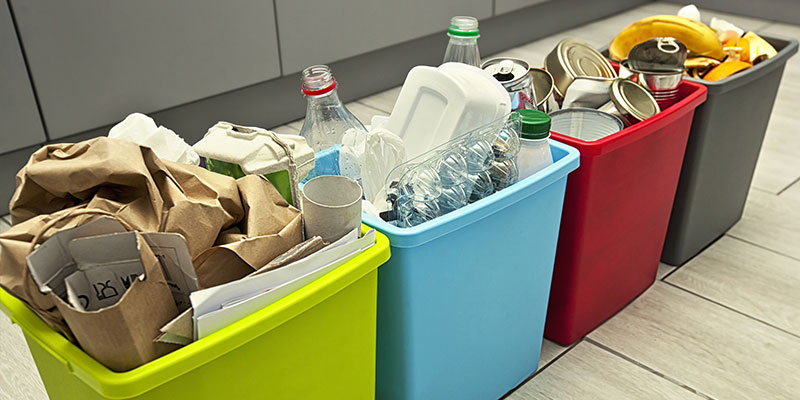We are living in a society where everything is disposable and the more we consume the more we end up throwing away. Overconsumption and waste have become so ‘normal’ these days that it can be hard to imagine things being any other way.
This type of throwaway living just isn’t sustainable in the long run though. Reusing and recycling can go a long way to easing the problem but reducing the waste we produce in the first place can also make a significant difference, so here are some tips on how to reduce the most common areas of household waste.
Household Food Waste
Figures from 2015 showed the UK throwing away £13 billion of household food waste in a year (about 7.3 million tonnes). Some waste is inevitable (egg shells, tea bags, etc) but a large proportion of this waste can be avoided.
It sounds obvious but try to get in the habit of using up what you’ve already bought before you buy more groceries. This is especially important with fresh produce such as fruit or vegetables, bread, etc. Checking what you have in the fridge and cupboard before making a shopping list is so simple to do but most of us just don’t bother.
Another culprit we all know of when it comes to food waste is buying in bulk to ‘save money’. All the ‘buy one get one free’ or ‘three for the price of two’ deals entice us into buying more than we need, with way too much of it ending up in the bin – a waste of your hard earned money as well as a waste of food. Try to resist these offers unless you are certain you can use it all up and have a plan for doing so.
Technology and Gadgets
These are another area where we seem to be constantly throwing things away. Technology seems to date so quickly and there’s always a new gadget or newer version we hanker after. Sometimes we really do just need to think seriously about whether we do actually need that shiny new toy or whether we are just buying it for the sake of it or to impress others.
Other times though you may really need to upgrade or buy a new piece of technology and in these cases you can do it with a clearer conscience if you’ve ensured its predecessor doesn’t go to waste. Gumtree, Facebook or Freecycle are all good places to sell or donate your old technology to someone who will get good use out of it. If you have children it might also be worth checking whether their school would be interested, as their budgets are limited and they are quite often working with outdated technology.
Clothing
Fashion too has become disposable. It’s often cheaper to buy a new item of clothing than it is to repair the old. Buying cheap isn’t always the most cost effective in the long run though, and spending a bit more to buy quality will usually mean it lasts longer and works out less expensive on a ‘cost per wear’ basis. However there are situations where it’s difficult to avoid buying clothes that will only be worn a few times (fast growing children are a prime example) and in these situation clothing is at least one of the types of potential waste that can most easily be reused or recycled. For items in good repair you can sell at car boot sales or on Facebook, or donate to a local charity. For clothing that has had its day there are also plenty of textile recycling bins around and some charities will also take ‘unwearable’ clothing to recycle – just check with them first.
We’re all guilty of being wasteful at times, and with our hectic lives it’s easy to forget that a lot of the time reducing our household waste isn’t really all that difficult – just being aware of the small things you can do to cut it down can make a big difference without being too onerous.



